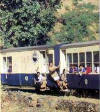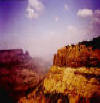


MATHERAN
 |
 |
 |
A PASSAGE TO MATHERAN
"Do not crowd on one side of the coach, it is dangerous,” reads the cryptic sign, and the point is further driven home by a graphic illustration of several stick-like figures weighing the scales down on one side, while other hapless figures hang in the air on the other balance. Parents and children and weekending couples obligingly spread their weight around inside the little toy train as it trundles up the winding hilly slopes to Matheran.
The train ride sets the tone for the rest of your holiday—languorous, and pleasant. Friendly dales, the shimmer of a lone waterfall, a brief length of tunnel, and loamy stretches of green sweeping upwards greet the eyes.
Nimble-footed schoolchildren spring expertly onto the running board and jump off a half hour later. Their village and school are a hill apart.
Fruit sellers perch themselves on the footboards of the train. People buy and savor the juicy sweetness of the fruit. After all, there is nearly an hour to go before you grind to a halt at Matheran station
The air is bracing as you move out of the station into the open. A babble of voices interspersed with neighing sounds greets you. You are in the tiny bazaar where stalls and teashops and rows of fine-boned horses abound. In line with the horses is another strange sight—of men standing as though tethered to their one-seat wagons. This will be your main mode of transport in Matheran—man-pulled buggy.
Somewhere deep down in your heart, you cringe at the thought of what you are doing—making fellow human beings carry you like beasts of burden, but after a while you get used to it. One could opt instead for sightseeing on horseback, but the buggy has a charm of its own. Besides, it is one of the chief livelihoods of these wiry mountain men, and their cheery faces and merry spirits do much to quell your conscience.
THE SERENE LANDSCAPE
It takes only a few minutes to realize why Matheran has this untouched, pristine quality about it. Automobiles and vehicles of any sort are not allowed into Matheran. This little hill paradise has been left largely undisturbed, since the time an Englishman, Hugh Mallet, Collector of Thane, discovered it in 1850 and declared it a fine place for shady walks.
The inhabitants used to fish and keep goats; they still do, though today the tourist trade takes precedence over everything else.
The roads are still kutcha, there has been no attempt to prune the hedges or smarten up the vegetation, or introduce any kind of uniformity into its environment. Yet, nature herself maintains a mild discipline. The heavy branches of trees are not so thickly interwoven that you cannot see through them; the shrubs do not spill over indiscriminately on to the roads.
Monkeys are your companions wherever you go. They sit in your verandah and on your porch, hugging their babies, combing their hair, squabbling occasionally as humans do. As you jog along in your buggy, monkeys dangle themselves strategically, one paw hanging free to grab your packet of chips. You could wave your crooked pandhari stick (a kind of walking stick) at them, but their mournful expressions would melt the sternest heart.
It is possible that you will meet Abbas in Matheran. He belongs to the village that nestles in the narrow picturesque valley, a few furlongs from the bazaar. Abbas is among the younger set of buggy pullers, and perhaps the most buoyant of them all. He will keep up a lively stream of conversation as he runs on light feet, describing the variety of trees and shrubs, the lake, the bharang leaves that are used to treat snake bite, and he will guide you with proprietary pride to the most spectacular viewpoints. You can stand atop these peaks and survey the wild ravishing landscape, and the reddish brown mountain ranges.
The red soil is everywhere. Matheran is a continuous poem of shady, thickly wooded paths of red mud and velvet moss, stretching endlessly.
Getting away from a city is not always possible on a holiday, it travels with you to the most unlikely places and is heard blaring from portable transistors and motorcars, merging with the raucous of streets overflowing with thoroughfare.
But in Matheran it is possible to forget that cities exist, it is possible to believe that you are ensnared in a time web from which release is not desirable. Such is the balmy calm of the place, the quiet and the green of the woods that seem to transform the most strident noises into gentler sounds.
THE MARKETPLACE
Even the bazaar is just that—a small marketplace, not a commercial shopping complex. It runs the length of one street, and contains shops and stalls that sell the produce of Matheran. You can see workmen hunching over strips of leather, fashioning the Kolhapuri chappal that Matheran is famous for. Leather bags, leather belts, leather shoes…the workmanship is exclusive and the prices reasonable. There are also glass birds and dried wild flowers for sale that have a quaint appeal.
One other thing that dominates the market is chikki, a confection made of gram flour, jaggery and cashew nut. You could buy chikki in kilos to carry home; it is a universally popular sweetmeat.